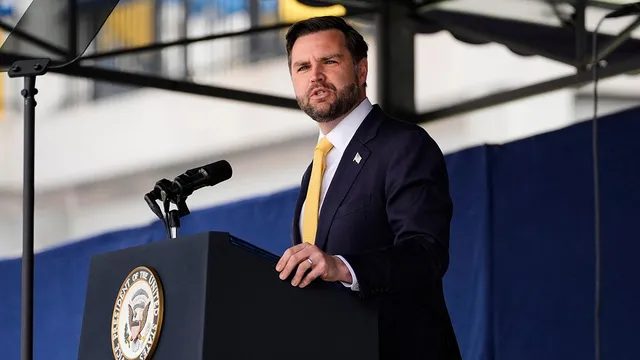
JD Vance threatens US disengagement from Russia-Ukraine peace talks
2025-05-23 16:17- JD Vance expressed willingness for the U.S. to potentially disengage from peace negotiations between Russia and Ukraine, emphasizing the need for clear objectives in military engagements.
- Vance's comments come amid ongoing peace negotiations initiated by President Donald Trump in collaboration with Putin.
- Political analysts caution that a reduction in U.S. involvement could benefit Russia and weaken support for Ukraine.
Express your sentiment!
Insights
In recent remarks, Vice President JD Vance indicated the United States might withdraw from peace negotiations regarding the ongoing conflict between Russia and Ukraine. This statement came after a phone conversation between President Donald Trump and Russian President Vladimir Putin, aimed at advancing peace talks to end the conflict. Vance noted that the negotiations had reached an impasse, implying a potential reevaluation of U.S. involvement if progress is not made. This reflects a broader trend within the Trump administration to reassess the U.S. role in international conflicts and prioritize clear objectives for military action. Moreover, Vance emphasized that the responsibility for resolving the conflict primarily lies with President Joe Biden and Putin, distancing the current administration's approach from past involvement in foreign wars. Other officials, including Trump, have also suggested a limited timeframe for U.S. mediation, reinforcing the stance that continuous engagement is not guaranteed if negotiations fail. Vance’s statements have invoked concerns among analysts and Ukrainian officials about the implications of reduced U.S. support for Ukraine and the potential benefits that would arise for Russia. The ongoing discourse raises questions about the future of U.S.-Russia relations and the broader geopolitical landscape in Eastern Europe, which remains fragile and complex. As peace talks continue, the effectiveness of U.S. involvement remains under scrutiny, highlighting the need for strategic engagement in international diplomacy.
Contexts
The historical context of US and Russia relations is marked by a complex interplay of cooperation and conflict, shaped by ideological differences, geopolitical interests, and global events. The relationship traces back to the late 18th century, primarily through early diplomatic exchanges. However, it was during the Cold War, which began in the aftermath of World War II, that relations were most defined by mutual suspicion and rivalry between the capitalist United States and the communist Soviet Union. This era saw the establishment of a nuclear arms race, extensive espionage, and proxy wars across the globe, profoundly impacting international relations and domestic policies in both countries. The Cold War was characterized by a series of defining events, such as the Berlin Blockade, the Korean War, and the Cuban Missile Crisis, which came alarmingly close to escalating into full-scale nuclear warfare. The ideological battle extended beyond military confrontation, permeating cultural and technological arenas through initiatives like the Space Race. The eventual dissolution of the Soviet Union in 1991 marked a significant turning point, leading to a brief period of optimism in US-Russia relations characterized by increased diplomatic exchange and arms reduction agreements, including the START treaties. However, this phase of collaboration was short-lived, as both countries began to reassess their national interests in the post-Cold War landscape. NATO's eastward expansion, perceived as a threat by Russia, along with conflicts in the Balkans and the Caucasus, strained relations in the late 1990s and early 2000s. The rise of Vladimir Putin and a resurgence of Russian assertiveness on the global stage, particularly in regions like Ukraine and Syria, ushered in a new era of confrontation, marked by sanctions, military posturing, and accusations of election interference, which have further polarized the relationship. As of 2025, the trajectory of US-Russia relations remains uncertain, oscillating between periods of heightened tensions and attempts at dialogue. Issues such as cybersecurity threats, the proliferation of nuclear weapons, and global climate change compel both nations to find common ground despite their vast differences. Understanding this historical context is essential for any analysis of current and future interactions, as the legacies of the past continue to influence diplomatic strategies and perceptions in both countries.